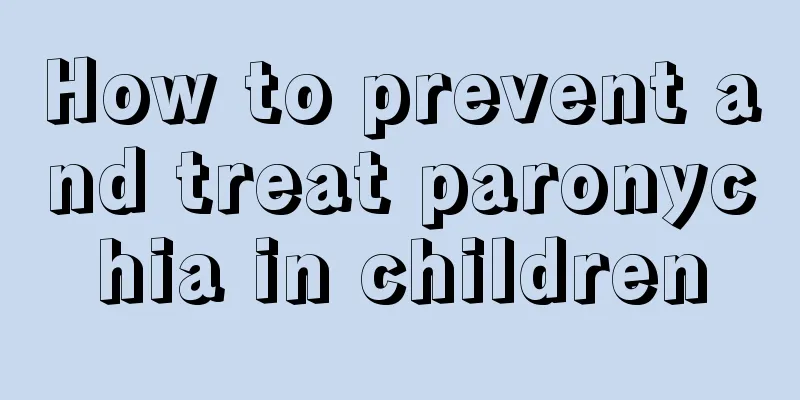How to prevent and treat paronychia in children

|
Paronychia in children seriously affects their mood and is one of the factors that lead to depression in children. So what is paronychia in children? What is the best way to treat paronychia in children? How to prevent paronychia in children? The following editor will introduce you in detail. What is paronychia?If the toenail is cut too short, the soft tissue next to it will grow upwards because it is not covered by the toenail. As a result, when the toenail grows out, it will pierce the soft tissue.Wearing inappropriate shoes. Inappropriate shoes, such as pointed leather shoes that are too narrow in the front, will squeeze the soft tissue of the toes, and over time, ingrown toenails will form. This is the most common cause of paronychia.The toes have been injured. Due to playing football, collision, or being hit, the toes may be damaged, which may affect the nail bed or nail and cause deformity.How to treat paronychiaTraditional Chinese Medicine Treatment 1. Internal treatment: Generally, internal treatment is not required. If the condition is serious, it is advisable to clear away heat and detoxify, and use Wuwei Xiaodu Yin plus Huanglian Jiedu Tang with modifications. 2. External treatment: Mix the paronychia powder with honey and apply it evenly to the red and swollen area about 0.5cm if there is no wound, bandage with gauze, once a day. Principle: Because the prescription contains Chinese herbal medicines such as turmeric, rhubarb, phellodendron, coptis root, and cnidium monnieri, which can clear away heat and detoxify, reduce swelling and discharge pus. Western medicine treatment 1. In the early stage, you can use hot compress, physical therapy, external application of ichthyol ointment or Sanhuang powder, and the application of iodine amine or antibiotics. 2. If there is pus, a longitudinal incision can be made at the nail groove for drainage. When the infection has spread to the subcutaneous area around the base of the nail, a longitudinal incision can be made at the nail groove on both sides, the epithelial sheet at the root of the nail can be turned up, the root of the nail can be removed, and a small piece of vaseline gauze or latex sheet can be placed for drainage. 3. If pus has accumulated under the nail bed, the nail should be removed, or the nail on the pus cavity should be cut off. When removing the nail, care should be taken to avoid damaging the nail bed to prevent deformity of the new nail in the future. How to prevent paronychiaThe reason why the nail groove is infected by bacteria is that in most cases there have been injuries to the nail and its surroundings, and these injuries are only small and tiny wounds. Therefore, you should pay attention to protecting yourself and avoid getting hurt. Once a small wound appears, don't be careless and use iodine to sterilize it in time.For toenails, you should pay attention to giving them some space. When buying shoes, don't be too picky about the size, and pay attention to the style. Narrow-headed shoes like peep-toe shoes will make your feet look smaller, but they will cause toenails to grow deeper into the flesh. So you should buy looser styles so that your toes won't be too crowded.For those who sweat a lot on their feet, you should be especially careful when choosing the materials of shoes and socks. Buy leather shoes with good breathability, wear sports shoes as little as possible, choose pure cotton socks with good sweat absorption, change socks frequently, and dry the insoles frequently. Don't let your feet stay stuffy for a long time, because foot sweat can easily breed bacteria.Cutting nails is a sign of cleanliness, but some people are too cruel and always cut their nails very short. In fact, this practice is not only easy to hurt the fingers, but also easy to make the nails dig into the flesh during the growth process. Therefore, cutting nails should be done in moderation, and it is not good to cut them too short.When paronychia first appears, pus often has not yet formed. At this time, you can apply ichthyol ointment around the affected area to reduce inflammation and swelling. While applying external medication, you should also take cephalosporin antibiotics orally, taking a two-pronged approach.If the inflammation is severe and suppuration has occurred, you should go to the hospital for incision and drainage while continuing to take antibiotics to drain the pus, which will help the inflammation heal.When incision and drainage do not improve, the situation is more serious and you need to go to the hospital for nail removal. It is generally recommended to remove the entire nail to allow the disease to heal better. |
Recommend
How to open Liby dishwashing liquid? Which type of Liby dishwashing liquid is the best?
Liby dishwashing liquid is something that everyon...
Can Safeguard soap be used to wash underwear? Can Safeguard soap be used to wash clothes?
Normally, we use soap to wash clothes, but unfort...
Can babies wear open-crotch pants in summer? Are there any harms for babies wearing open-crotch pants?
Summer is here, and many people like to change th...
What medicine is the best for infant diarrhea? What are the symptoms of infant diarrhea?
Usually, babies' stomachs are very fragile. I...
What to do if your child has poor social skills? 5 steps to become a social expert
The first step is to help enrich children's k...
Why do infants roll their eyes when they sleep? What are the precautions for babies to learn to swim?
Some babies roll their eyes when they sleep, whic...
Children's height and weight standard table 2017 Children's height and weight calculation formula
How can we judge whether the baby's height an...
Can I keep the baby if I get pregnant after drinking? Does taking medicine have any impact on pregnancy?
Many people who have unexpected pregnancies have ...
Can painless labor last until the birth? How many times can painless labor be given?
Many expectant mothers choose painless delivery t...
Does low menstrual flow really affect pregnancy?
In modern society, work pressure is high. Some wo...
How do I know if I am pregnant? What are the symptoms of pregnancy?
It is difficult to detect the early stage of preg...
How to treat postpartum disease How to treat postpartum disease
It is a Chinese tradition that pregnant women sho...
What style of mommy bag is good? Which of the three styles is suitable for you?
The first is the hand-held type, which is very sm...
What are the advantages and benefits of babies learning English
1 So what are the advantages of babies learning E...
How many degrees is better to heat children's food? Over 65 degrees will damage the esophagus
Don't exceed 65 degrees, which will damage th...









